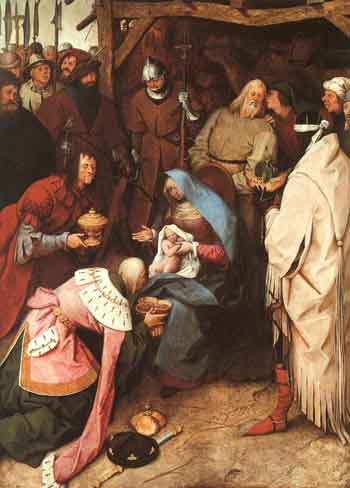The gifts have all been opened (and more than a few already exchanged). Shredded wrapping paper has been bagged and tossed. On many street curbs dried-up evergreens await disposal. But Christmas isn’t over, not yet.
This is the season of Epiphany, also known as the Twelve Days of Christmas. On January 6 a quiet and (thankfully) uncommercialized observance will take place around the world—Three Kings Day.
Epiphany is not the sort of word that one hears on ESPN or reads in the New York Times. If you were to tell a friend, “I had an epiphany,” he might reply, “My Uncle Ralph had one of those, too, but his doctor removed it and he’s doing fine now.”
“Epiphany” means “an appearance” or “something revealed.” An angelic visitation would be considered an epiphany. The car keys you misplaced after last year’s office party would not.
January 6 commemorates the visit a group of astrologers paid on Jesus not long after his birth. Matthew is the only gospel writer to record this event.
Jesus was born in the town of Bethlehem in Judea, during the reign of King Herod. About that time some wise men from eastern lands arrived in Jerusalem, asking, “Where is the newborn king of the Jews? We have seen his star as it arose, and we have come to worship him.” —Matthew 2:1-2, NLT
These men have been referred to as “the three kings” (not to be confused with “The Three Amigos”), the Magi and the wise men (again, not the same as “wise guys”). Scholars have suggested that they were wealthy, though not necessarily royal. They likely came from Saudi Arabia or Egypt. They were observers of the heavens, astronomers, who had noticed a new star and correctly guessed that it brought news of some great event. Legend has it that the birth of Alexander the Great was presaged by the appearance of a new star—it was commonly assumed that the birth or death of great men would be foretold in the sky.
So the Magi set out on a costly journey to find this child, having somehow determined that the one they were looking for was to become “The King of the Jews.” This same title would later surface at Jesus’ crucifixion:
A signboard was fastened to the cross above Jesus’ head, announcing the charge against him. It read: “This is Jesus, the King of the Jews.” —Matthew 27:37, NLT
Matthew claims that Herod and all of Jerusalem were greatly disturbed by the arrival of the Magi and news of their mission. After conferring with them privately, Herod takes their information seriously enough that he plans to have the child murdered. Why this sudden burst of worry? Surely Herod had already heard of the virgin birth of Jesus and the angelic appearances that had announced that birth?
Or, perhaps not. Bethlehem was a hick town. Perhaps the news had not reached Herod. Or did Herod simply dismiss these rumors, until the arrival of the Magi?
To Herod, the Jews were just a bunch of religious wackos. They were always having visions, always hearing the voice of God, always seeing angels. It was like a whole country tripping on acid—you never knew what hallucinogenic hoo-hah would grab the headlines next.
But the Magi were different. These were learned men who made their living advising kings, sultans and sheiks. If CNN had been in existence, the Magi would have been the talking heads of the first century, providing instant analysis and carefully-considered opinions about world events and the signs of the times.
In a word, the Magi had credibility. They were gentiles, not Jews. They had no personal stake in the birth of a Jewish Messiah. And yet, these men had come following a star convinced that a child of great importance had been born in Israel. They had come bearing gifts; they had come prepared to bow down and worship this young king.
After [speaking with King Herod] the wise men went their way. Once again the star appeared to them, guiding them to Bethlehem. It went ahead of them and stopped over the place where the child was. When they saw the star, they were filled with joy! They entered the house where the child and his mother, Mary, were, and they fell down before him and worshiped him. Then they opened their treasure chests and gave him gifts of gold, frankincense, and myrrh. But when it was time to leave, they went home another way, because God had warned them in a dream not to return to Herod. —Matthew 2:9-12, NLT
Among the reasons that Christians observe Epiphany is this: it is the first recorded instance of non-Jews paying homage to—yes, even worshiping—the Messiah of Israel.
If Jesus is the King of the Jews, he is also my King, though I am a gentile, just like the Magi. I have been adopted into God’s family (Galatians 4:6). I have been grafted into the vine (Romans 11:17). I was an outsider, but now I have been ushered into the House of God (Colossians 3:11). All of this, because the King of the Jews was crucified and on the third day rose again from the dead.
I am no astronomer, but like the Magi, I am a stranger from the (far) east. Like the Magi, I go to the King of the Jews to offer my gifts and my worship.
They followed the star until they found Him. They placed their gifts at His feet and worshiped Him. And thus, the identity of this child was revealed not only to the Jews, but to the entire world. Epiphany.




Christian Carnival: 2005 No. 1
With Christmas past, we’ve entered the season of Epiphany. Charles Lehardy presents another think on the significance of Epiphany.